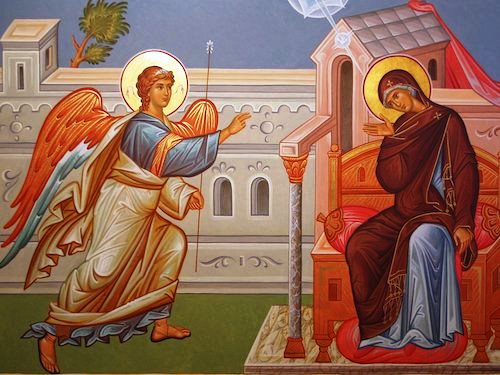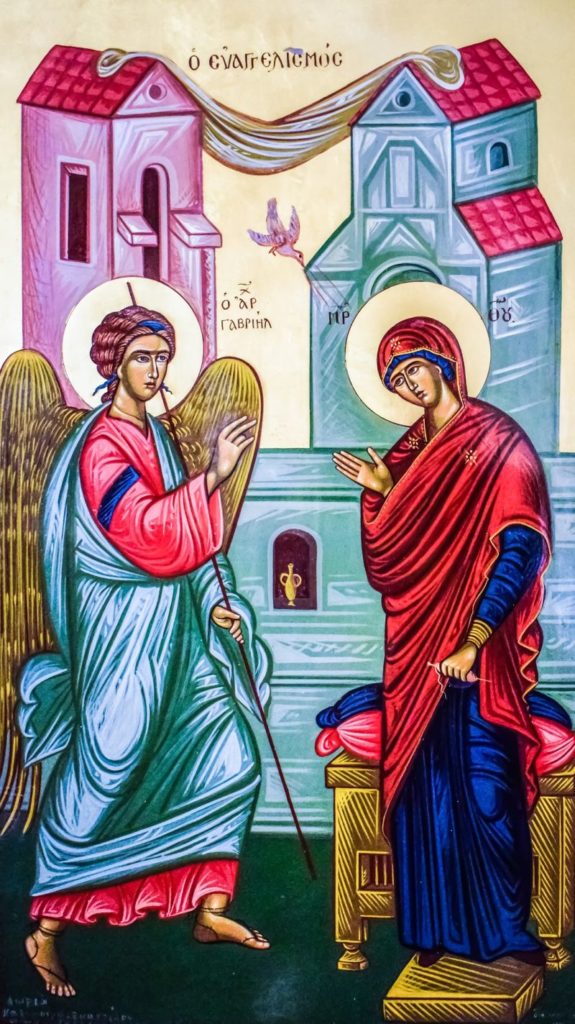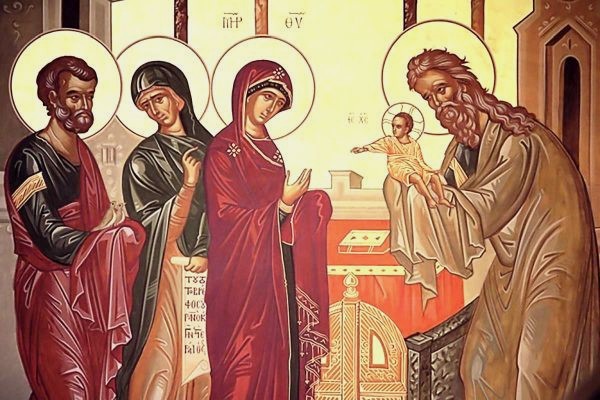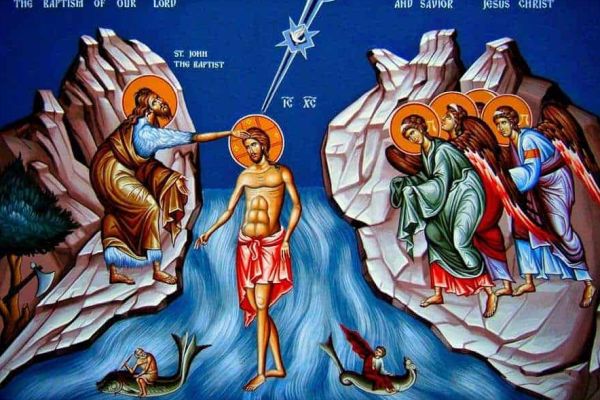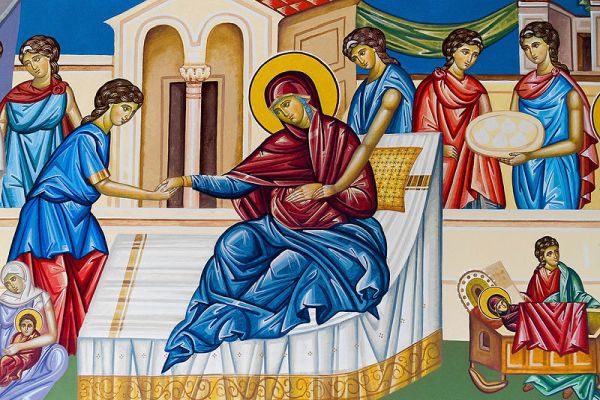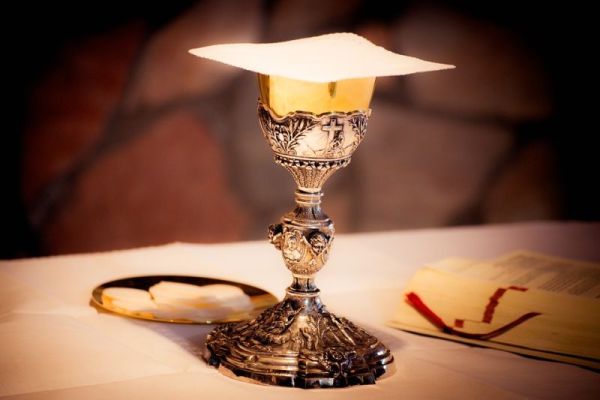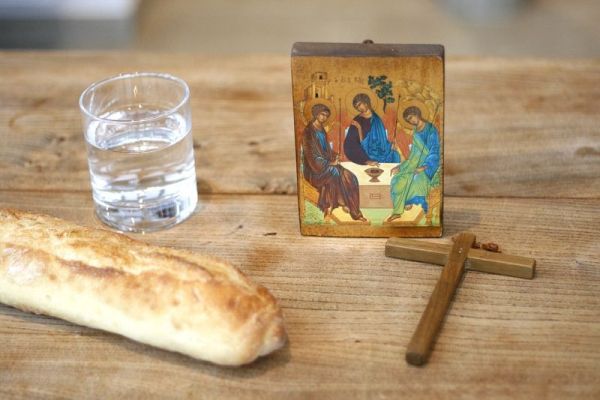The Feast of the Annunciation
The Feast of the Annunciation1 celebrates the announcement by the angel Gabriel about the birth of Christ to the Virgin Mary (St. Luke 1:26–38) thus announcing the beginning of the fulfilment of God’s promise of sending His Son for the redemption of the world.
This feast is one of the 12 Great Feasts of the Orthodox Church and is also called as the ‘Feast of the Annunciation of the Lord’ or the ‘Annunciation to the Theotokos’.
Date:
March 25 was selected as the date for the Annunciation since it is exactly 9 months before the birth of Jesus Christ.
The Event
According to the Gospel narrative of The Annunciation in St. Luke 1:26-382, at about the time that Elizabeth was six months pregnant with John the Baptist, the Archangel Gabriel was sent by God to the Virgin Mary to announce to her that she would conceive and bear a son. According to the holy tradition, Mary had been serving in the temple from her childhood until she reached puberty, which was when she was sent back to her home in Nazareth and engaged to marry a widower Joseph.
On hearing the Angel’s announcement, Mary is understandably troubled, and wonders how it would happen since she “knew no man.” Then Gabriel reveals to her the mystery of how the Incarnation would take place “The Holy Spirit will come upon you, and the power of the Highest will overshadow you; therefore, also, that Holy One who is to be born will be called the Son of God.”3
The angel’s pronouncement is then met with Mary’s willing consent: “Here am I, the servant of the Lord; let it be with me according to your word.”
Icon of the Feast
In several of the Icons of the feast, the Archangel Gabriel is shown with his hand raised in salutation to St. Mary. His greeting revealed the high position with which Mary was to be regarded henceforth – “Rejoice, highly favored one, the Lord is with you; blessed are you among women!” In his left hand is a staff, the symbol of a messenger.
On the right side of the icon stands the Holy Virgin with her right hand raised in a gesture of humble acceptance to God’s plan of salvation. In some icons, the Virgin is shown seated on an elevated seat, showing the Church’s understanding that as the Mother of God, she receives great honor.”4
In her left hand she holds a spindle of yarn which brings to remembrance the tradition that she was busy making material for the veil of the Temple in Jerusalem, when the angel surprised her. As in most icons that depict the Theotokos, the three stars on her garments represent that she was a Virgin before, during, and after the birth of Christ.
At the top of the Annunciation icons, there is usually a segment of a circle with emerging rays or a dove that represents the coming of the Holy Spirit upon her.
How the Feast is celebrated
Though the Annunciation is an event that, like Christmas, celebrates the Good News of the Incarnation, the celebrations are somewhat subdued because March 25 falls in the middle of Great Lent in the Liturgical calendar of the Church.
But it is a testimony to its importance that it is the only Feast permitted to be celebrated with the Holy Eucharist other than Sundays and Easter during the season of Great Lent5.
The feast is normally celebrated with the Divine Liturgy, the services, hymns and prayers all stressing on the joyous news of the salvation of men in the birth of the Savior.
The main readings of the Feast are as follows:
• Gospel reading: Luke 1:26-38
• Old Testament: the readings are related to the prophecies about the incarnation from the OT such as Genesis 3:1-19 (the seed of the woman) and Genesis 28:10-17 (Jacob’s ladder), Proverbs 2:1-22 & 9:1-11 (The Wisdom of God) & Isaiah 7:10-15 (The virgin shall give birth)
• Epistles: Hebrews 2:11-18, Galatians 3:25-29 & 1 John 3:2-12
Significance of the Feast of the Annunciation
If Christmas is the greatest story ever told, then the Annunciation is the opening chapter of that story. Christmas is the day on which we celebrate the birth of the Savior in the human flesh, but the Annunciation is the day when we remember that He was first conceived as a human of the Holy Spirit.
This was the fulfilment of God’s promise foretold in the Scriptures centuries ago through the prophet Isaiah – “Behold, the virgin shall be with child, and bear a Son, and they shall call His name Immanuel,” which is translated, “God with us.”6
Divine Initiative – The Annunciation and thus the Incarnation was planned by God Himself as a means of the salvation for mankind. It was His initiative. God could have become man in any number of creative ways. He could have incarnated Himself just as Adam was, by being formed from the clay. Or He could have directly come down to us from heaven. But He chose, however, to become man like we all become man. In the same way that He would exit the world through the door of death, as we all have to do, before His Resurrection and Ascension, He also entered the world through the door of human birth.
As the 4th century Church Father Gregory of Nazianzus wrote, Christ could not redeem what He did not assume7. He redeemed everything because He took on human nature in all of its breadth, depth, complexity and mystery. He was like us in all things save sin.
Human Response – Yet, at the same time, we also see that a human response was involved, whereby Mary freely accepted the vocation offered to her though she knew it would result in ridicule, shame and ostracization for her and her family. God elected to become man, and He desired to do this with the willing agreement of her whom He chose as His mother. In other words, Mother Mary was not a passive instrument, but rather an active participant with a free and positive part to play in God’s plan for our salvation. She was and still remains the great example for us.
Thus, when on this and other feasts the Orthodox Church honors the Theotokos, the Mother of God, it is not just because God chose her but also because she herself chose to follow His will. She who was a mere human was given the privilege of being chosen by God to bear His Son. Again, we remember the words of the Archangel who revealed that the Theotokos was ‘highly favored’ and ‘blessed among all women’. It is because of this favour she has as the Mother of God that we always ask her to intercede for us ‘now and at the hour of our deaths’.
Conclusion:
The Feast of the Annunciation also bids us to remember and emulate the obedience of the Theotokos during the Lent season. Just as she said “Be it unto me according to your word”, we the faithful are called to submit ourselves to God and His Holy Church even at times when it may result in us being side-lined or ostracized for being true to the faith.
Both humility and obedience are things that we are constantly working on in our own lives, especially during the season of Great Lent! The Feast of Annunciation is another way for us to be reminded of what God can do when both are exercised perfectly. Let us accordingly prepare ourselves and our family members to celebrate this great feast!
Today is the beginning of our salvation, And the revelation of the eternal mystery! The Son of God becomes the Son of the Virgin As Gabriel announces the coming of Grace. Together with him let us cry to the Theotokos: "Rejoice, O Full of Grace, the Lord is with you!"8
1This is derived from the Latin ‘Annuntiatio’ which means ‘message’ or ‘declaration’. The related term in Syriac is ‘Suboro’.
2A separate and briefer annunciation is given by an angel to St. Joseph in Matthew 1:18-21, after he has just found out that his betrothed Mary is pregnant.
3Luke 1:35
4“greater in honor than the cherubim, and beyond compare more glorious than the seraphim, who without corruption gave birth to God the Word” These words from the ‘Axion Estin’, a common Hymn to the Theotokos that is used in the services of the Eastern Orthodox Churches show how great reverence was accorded by the orthodox Church to the Theotokos.
5This holds true for the Syrian Orthodox Churches in India as well.
6Isaiah 7:14
7From St. Gregory’s ‘Critique of Apollinarius and Apollinarianism”.
